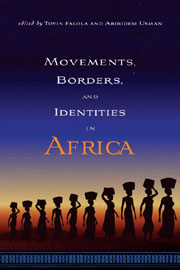Book contents
- Frontmatter
- contents
- Preface
- Introduction: Migrations in African History: An Introduction
- PART A State Formation and Migration Crossroads
- PART B Movements and Identities
- 6 Squatting and Settlement Making in Mamelodi, South Africa
- 7 “Scattering Time”: Anticolonial Resistance and Migration among the Jo-Ugenya of Kenya toward the End of the Nineteenth Century
- 8 Traders, Slaves, and Soldiers: The Hausa Diaspora in Ghana (Gold Coast and Asante) in the Nineteenth and Early Twentieth Centuries
- 9 Ethnic Identities and the Culture of Modernity in a Frontier Region: The Gokwe District of Northwestern Zimbabwe, 1963–79
- 10 Displacement, Migration, and the Curse of Borders in Francophone West Africa
- 11 Shifting Identities among Nigerian Yoruba in Dahomey and the Republic of Benin (1940s–2004)
- 12 Identity, “Foreign-ness,” and the Dilemma of Immigrants at the Coast of Kenya: Interrogating the Myth of “Black Arabs” among Kenyan Africans
- 13 Labor Market Constraints and Competition in Colonial Africa: Migrant Workers, Population, and Agricultural Production in Upper Volta, 1920–32
- List of Contributors
- Index
11 - Shifting Identities among Nigerian Yoruba in Dahomey and the Republic of Benin (1940s–2004)
from PART B - Movements and Identities
Published online by Cambridge University Press: 12 September 2012
- Frontmatter
- contents
- Preface
- Introduction: Migrations in African History: An Introduction
- PART A State Formation and Migration Crossroads
- PART B Movements and Identities
- 6 Squatting and Settlement Making in Mamelodi, South Africa
- 7 “Scattering Time”: Anticolonial Resistance and Migration among the Jo-Ugenya of Kenya toward the End of the Nineteenth Century
- 8 Traders, Slaves, and Soldiers: The Hausa Diaspora in Ghana (Gold Coast and Asante) in the Nineteenth and Early Twentieth Centuries
- 9 Ethnic Identities and the Culture of Modernity in a Frontier Region: The Gokwe District of Northwestern Zimbabwe, 1963–79
- 10 Displacement, Migration, and the Curse of Borders in Francophone West Africa
- 11 Shifting Identities among Nigerian Yoruba in Dahomey and the Republic of Benin (1940s–2004)
- 12 Identity, “Foreign-ness,” and the Dilemma of Immigrants at the Coast of Kenya: Interrogating the Myth of “Black Arabs” among Kenyan Africans
- 13 Labor Market Constraints and Competition in Colonial Africa: Migrant Workers, Population, and Agricultural Production in Upper Volta, 1920–32
- List of Contributors
- Index
Summary
Introduction: The Invented Origins of Foreign-Based Yoruba Associations
In many African cities, immigrants join associations that aim to recreate a social structure reminiscent of their native land or hometown. The size and recruiting areas of these associations depend mostly on the size of the immigrant communities and on the immigration policy, with regard to foreigners, of the country in which they are resident. Cross-border migrations are not necessary for the foundation of such groups, but their usefulness is more apparent when foreign immigrants are concerned. Shifting identities among Nigerian Yoruba in the Republic of Benin (ca. 1940–ca. 2005) raise two questions: To what extent can we identify the conceptual origins of these structures that attract migrants? And how did these associations cope with their political and social environments in the second half of the twentieth century, when they were confronted with radical challenges to their structures of self-integration or self-organization? This chapter aims to show that Yoruba identities have been subject to permanent changes and adaptations during the last fifty or sixty years. Because well-known, familiar structures are imitated and copied in a different context from the original, these structures, half invented and half duplicated, contribute to the invention or the enhancement of identities.
The Historical and Conceptual Origins of Migrant Groups
In the case of Nigerian Yoruba in the Republic of Benin, the last sixty years clearly illustrate the necessity for migrants to cope with local conditions—not always in conformity with their own beliefs. Most of the Yoruba I interviewed from 1999 to 2005 said they preferred coming together in associations with people from their native city, but this is quite a recent preference.
- Type
- Chapter
- Information
- Movements, Borders, and Identities in Africa , pp. 238 - 260Publisher: Boydell & BrewerPrint publication year: 2009



